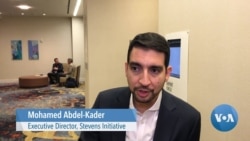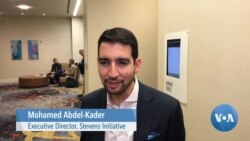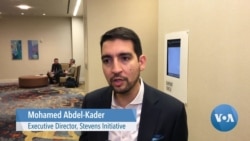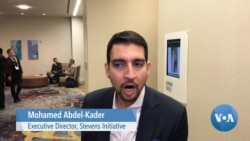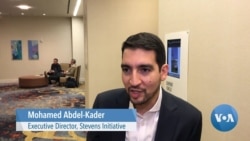Student Union
- By Julie Taboh
Students Become Neighbors Time Zones Apart
Relatively few students in the U.S. have opportunities to study abroad, says Mohamed Abdel-Kader, executive director of the Stevens Initiative, a public-private partnership based at the Aspen Institute in Washington, D.C.
“Some estimates right now have pegged about one in 10 American college students is having the opportunity to go abroad, and we'd certainly like to see those numbers a little bit higher,” he told VOA’s Student Union at the Association of American Colleges and Universities conference in Washington recently.
That proportion is even lower for American students going to the Middle East and vice versa, he said.
“What's really interesting to think about is about 2% of American college students who do study abroad, of that 10%, about 2% actually go to the Middle East and North Africa. And on the flip side, some estimates are that about 2% of young people in the Middle East and North Africa study abroad," Abdel-Kader said. "And I think we want more young people to interact with one another and learn about one another."
The goal of the Stevens Initiative is to connect students around the globe, particularly in the Middle East and North Africa.
And the Initiative has come up with a creative solution to help achieve that goal: a virtual exchange program.
“Virtual exchange is when two classrooms in different geographies essentially take out a wall between them -- that wall is obviously thousands and thousands of miles -- but that wall is really taken out between them by the use of technology, so that these young people in both classrooms are learning about one another, and they're learning together,” Abdel-Kader said.
“This is integrated into their classroom and moderated by their teachers, so that it's a dynamic learning experience where they're being exposed to different global issues, and they're collaborating with one another to try to solve them, and find out where their shared interests are, and where there may be differences to hopefully gain a better understanding of that issue from the different perspectives, and understand one another I think a little bit better as well," he said.
Abdel-Kader said the program is succeeding in a number of ways.
“One, we see that students first of all get to know one another and learn a lot about their peers in other classrooms across the world. Folks abroad learn more about Americans and everyday life in our 50 states," he said.
Students participating in virtual exchanges are more technologically literate, too, Abdel-Kader said.
“They're able to navigate technological tools with greater ease and collaborate with peers across borders, they’re able to communicate across those same borders with much more ease. And those experiences are happening in classrooms around the world, and we're very excited to be a part of that to help grow these experiences, and bring more educators into the fold," he said.
Chicago native Samuel Owusu’s curiosity about other languages and cultures inspired him to participate in a virtual exchange program to work on a joint project with students in Casablanca (Morocco) during his senior year at high school, Abdel-Kader said.
Owusu told the Stevens Initiative that he attributes a lot of his interest in the Middle East and North Africa to the weekly exchanges he was able to have with those students.
“We became friends. I understood that although they are a world away, they are our neighbors," Owusu said on the Initiative's website. "This changed my trajectory in college and in life."
Abdel-Kader said, "We've also seen that many students who participated in virtual exchanges are more prepared for the 21st-century workforce and that they're able to navigate time zones, they're able to navigate language barriers, and they're able to see complex global issues from a number of different perspectives. And that is certainly very helpful in the 21st-century workplace.”
That virtual exchange experience motivated Owusu, currently a junior at Davidson College in North Carolina, to travel to Lebanon recently for a study abroad program, Abdel-Kader said.
“So we're very excited to see that kind of impact and transformational experience that could start from a classroom at home and turn into a fantastic experience abroad that is just eye opening and transformational for a young person," he added.
“According to him and his testimonial, the experience really opened his eyes to life in Casablanca, he made friends, he was able to learn about them and communicate with them, but then also share about his life in Chicago," he said.
By the end of the year, the Stevens initiative will have reached about 40,000 young people in about 45 U.S. states and 15 countries in the Middle East and North Africa, reaching students who may not have had an opportunity to go abroad, Abdel-Kader said.
"And we're just very proud to see these young people connecting and building a future together," he said.
The Stevens Initiative was inspired by the late U.S. Ambassador J. Christopher Stevens, “a diplomat who got to know young people everywhere he went,” Abdel-Kader explained. “He was lost in the attack on the U.S. Embassy in Libya, and there was a desire to honor him.”
The Stevens Initiative works in close partnership with Ambassador Stevens’ family. It is sponsored by the U.S. Department of State, the Bezos Family Foundation and the governments of the United Arab Emirates and Morocco.
See all News Updates of the Day
- By VOA News
Competition grows for international students eyeing Yale

It’s tough to gain admission to Yale University, and it’s getting even tougher for international students as standout students from around the world set their sights on Yale.
The Yale Dale News, the campus newspaper, takes a look at the situation here.
- By VOA News
Student from Ethiopia says Whitman College culture made it easy to settle in

Ruth Chane, a computer science major from Ethiopia, writes about her experiences settling into student life at Whitman College in the U.S. state of Washington.
"The community at Whitman College made sure I felt welcomed even before I stepped foot on campus," she says.
- By VOA News
Claremont Colleges student gets a shock when she heads home to Shanghai

In The Student Life, the student newspaper for the Claremont Colleges, a consortium of five liberal art colleges and two graduate schools in Claremont, California, student Rochelle Lu writes about readjusting to her Shanghai home after spending a semester in the United States.
- By VOA News
Cedarville University aims to ease transition for international students

Cedarville University in the U.S. state of Ohio says it’s got more than 140 international students representing 44 countries.
Here, the school interviews Jonathan Sutton, director of international student services. He talks about his job and the opportunities for international students on campus.
- By VOA News
Morehouse College offers prospective students tips on applying and thriving

Morehouse College, a private, historically Black liberal arts college in the U.S. state of Georgia, offers a guide for international students interested in attending the school.
Among the tips to apply and thrive at Morehouse:
- Take advantage of the school’s orientation program
- Turn to the school’s Center for Academic Success for tutoring, support and more
- Immerse yourself in campus life via clubs and societies
- By Reuters
US reviews Columbia University contracts, grants over antisemitism allegations

The administration of President Donald Trump said on Monday it will review Columbia University's federal contracts and grants over allegations of antisemitism, which it says the educational institution has shown inaction in tackling.
Rights advocates note rising antisemitism, Islamophobia and anti-Arab bias since U.S. ally Israel's devastating military assault on Gaza began after Palestinian Hamas militants' deadly October 2023 attack.
The Justice Department said a month ago it formed a task force to fight antisemitism. The U.S. Departments of Health and Education and the General Services Administration jointly made the review announcement on Monday.
"The Federal Government's Task Force to Combat Anti-Semitism is considering Stop Work Orders for $51.4 million in contracts between Columbia University and the Federal Government," the joint statement said.
The agencies said no contracting actions had been taken yet.
"The task force will also conduct a comprehensive review of the more than $5 billion in federal grant commitments to Columbia University."
The agencies did not respond to requests for comment on whether there were similar reviews over allegations of Islamophobia and anti-Arab bias.
Columbia had no immediate comment. It previously said it made efforts to tackle antisemitism.
College protests
Trump has signed an executive order to combat antisemitism and pledged to deport non-citizen college students and others who took part in pro-Palestinian protests.
Columbia was at the center of college protests in which demonstrators demanded an end to U.S. support for Israel due to the humanitarian crisis caused by Israel's assault on Gaza. There were allegations of antisemitism and Islamophobia in protests and counter-protests.
During last summer's demonstrations around the country, classes were canceled, some university administrators resigned and student protesters were suspended and arrested.
While the intensity of protests has decreased in recent months, there were some demonstrations last week in New York after the expulsion of two students at Columbia University-affiliated Barnard College and after New York Governor Kathy Hochul ordered the removal of a Palestinian studies job listing at Hunter College.
A third student at Barnard College has since been expelled, this one related to the occupation of the Hamilton Hall building at Columbia last year.
Canada’s immigration overhaul signals global shift in student migration
From Europe to North America, nations are tightening their immigration policies. Now Canada, long seen as one of the world's most welcoming nations, has introduced sweeping changes affecting international students. The reforms highlight a growing global trend toward more restrictive immigration policies. Arzouma Kompaore reports from Calgary.
Trump administration opens antisemitism inquiries at 5 colleges, including Columbia and Berkeley

The Trump administration is opening new investigations into allegations of antisemitism at five U.S. universities including Columbia and the University of California, Berkeley, the Education Department announced Monday.
It's part of President Donald Trump's promise to take a tougher stance against campus antisemitism and deal out harsher penalties than the Biden administration, which settled a flurry of cases with universities in its final weeks. It comes the same day the Justice Department announced a new task force to root out antisemitism on college campuses.
In an order signed last week, Trump called for aggressive action to fight anti-Jewish bias on campuses, including the deportation of foreign students who have participated in pro-Palestinian protests.
Along with Columbia and Berkeley, the department is now investigating the University of Minnesota, Northwestern University and Portland State University. The cases were opened using the department's power to launch its own civil rights reviews, unlike the majority of investigations, which stem from complaints.
Messages seeking comment were left with all five universities.
A statement from the Education Department criticized colleges for tolerating antisemitism after Hamas' Oct. 7, 2023, attack on Israel and a wave of pro-Palestinian protests that followed. It also criticized the Biden administration for negotiating "toothless" resolutions that failed to hold schools accountable.
"Today, the Department is putting universities, colleges, and K-12 schools on notice: this administration will not tolerate continued institutional indifference to the wellbeing of Jewish students on American campuses," said Craig Trainor, the agency's acting assistant secretary for civil rights.
The department didn't provide details about the inquiries or how it decided which schools are being targeted. Presidents of Columbia and Northwestern were among those called to testify on Capitol Hill last year as Republicans sought accountability for allegations of antisemitism. The hearings contributed to the resignation of multiple university presidents, including Columbia's Minouche Shafik.
An October report from House Republicans accused Columbia of failing to punish pro-Palestinian students who took over a campus building, and it called Northwestern's negotiations with student protesters a "stunning capitulation."
House Republicans applauded the new investigations. Representative Tim Walberg, chair of the Education and Workforce Committee, said he was "glad that we finally have an administration who is taking action to protect Jewish students."
Trump's order also calls for a full review of antisemitism complaints filed with the Education Department since Oct. 7, 2023, including pending and resolved cases from the Biden administration. It encourages the Justice Department to take action to enforce civil rights laws.
Last week's order drew backlash from civil rights groups who said it violated First Amendment rights that protect political speech.
The new task force announced Monday includes the Justice and Education departments along with Health and Human Services.
"The Department takes seriously our responsibility to eradicate this hatred wherever it is found," said Leo Terrell, assistant attorney general for civil rights. "The Task Force to Combat Anti-Semitism is the first step in giving life to President Trump's renewed commitment to ending anti-Semitism in our schools."
- By VOA News
STEM, business top subjects for international students

The Times of India breaks down the most popular subjects for international students to study in the U.S.
STEM and business lead the pack. Read the full story here. (January 2025)
- By VOA News
Safety and visa difficulties among misconceptions about US colleges

U.S. News & World report addresses some of the misconceptions about U.S. colleges and universities, including the difficulty of getting a visa.
Read the full story here. (January 2025)
- By VOA News
Work opportunities help draw international students to US schools

US News & World Report details the three top factors in foreign students' decision to study in the U.S. They include research opportunities and the reputation of U.S. degrees. Read the full story here. (December 2024)
- By VOA News
British student talks about her culture shock in Ohio

A British student who did a year abroad at Bowling Green State University in Ohio talks about adjusting to life in America in a TikTok video, Newsweek magazine reports.
Among the biggest surprises? Portion sizes, jaywalking laws and dorm room beds.
Read the full story here. (December 2024)
- By VOA News
Harvard's Chan School tells international students what to expect

Harvard's T.H. Chan School of Public Health reaches out to international students by detailing the international student experience at the school.
Learn more about housing, life in Boston and more here.
- By Reuters
China unveils plan to build 'strong education nation' by 2035

China issued its first national action plan to build a "strong education nation" by 2035, which it said would help coordinate its education development, improve efficiencies in innovation and build a "strong country."
The plan, issued Sunday by the Communist Party's central committee and the State Council, aims to establish a "high quality education system" with accessibility and quality "among the best in the world."
The announcement was made after data on Friday showed China's population fell for a third consecutive year in 2024, with the number of deaths outpacing a slight increase in births, and experts cautioning that the downturn will worsen in the coming years.
High childcare and education costs have been a key factor for many young Chinese opting out of having children, at a time when many face uncertainty over their job prospects amid sluggish economic growth.
"By 2035, an education power will be built," the official Xinhua news agency said, adding that China would explore gradually expanding the scope of free education, increase "high-quality" undergraduate enrolment, expand postgraduate education, and raise the proportion of doctoral students.
The plan aims to promote "healthy growth and all-round development of students," making sure primary and secondary school students have at least two hours of physical activity daily, to effectively control the myopia, or nearsightedness, and obesity rates.
"Popularizing" mental health education and establishing a national student mental health monitoring and early warning system would also be implemented, it said.
It also aims to narrow the gap between urban and rural areas to improve the operating conditions of small-scale rural schools and improve the care system for children with disabilities and those belonging to agricultural migrant populations.
The plan also aims to steadily increase the supply of kindergarten places and the accessibility of preschool education.
- By VOA News
A look at financial aid options for international graduate students in US

The Open Notebook, a site focusing on educating journalists who cover science, has complied a list of U.S. graduate program financial aid information for international students.




